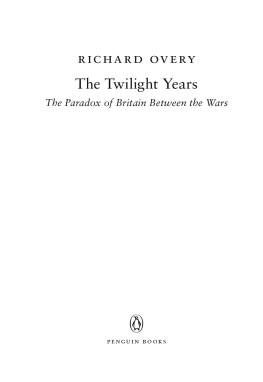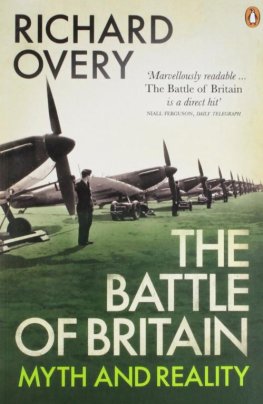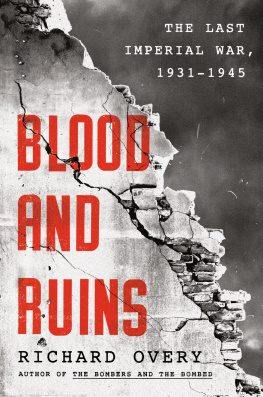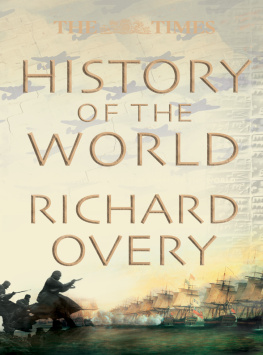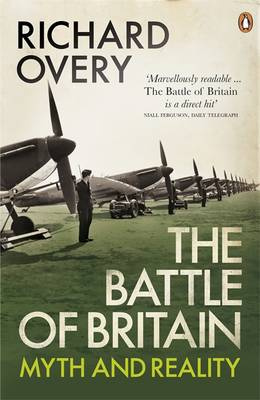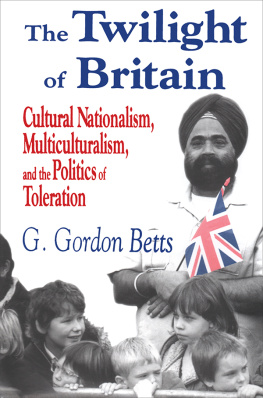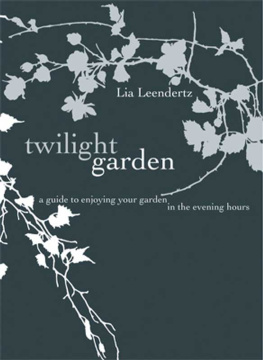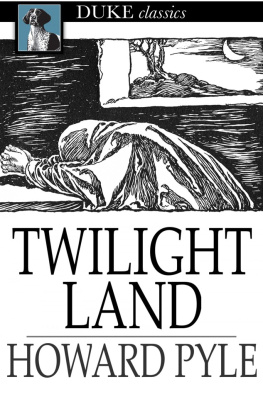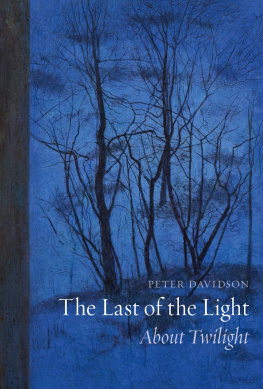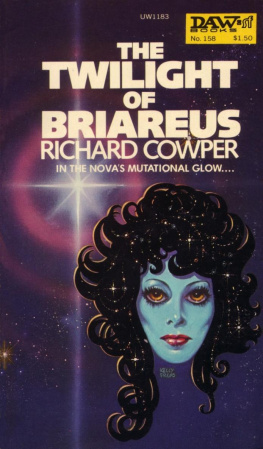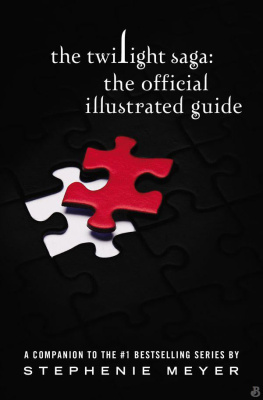Richard Overy is a professor of history at the University of Exeter. A leading expert in World War II history, he has written more than twenty books, including Why the Allies Won , which The Sunday Times of London called a masterpiece of analytical history The Dictators , winner of the Wolfson Prize in 2005; and Interrogations . He was the winner of the Samuel Eliot Morison Prize in 2001 and the General James Doolittle Award in 2010.
RICHARD OVERY
The Twilight Years
The Paradox of Britain Between the Wars

PENGUIN BOOKS
Published by the Penguin Group
Penguin Group (USA) Inc., 375 Hudson Street, New York, New York 10014, U.S.A.
Penguin Group (Canada), 90 Eglinton Avenue East, Suite 700, Toronto, Ontario, Canada M4P 2Y3 (a division of Pearson Penguin Canada Inc.)
Penguin Books Ltd, 80 Strand, London WC2R 0RL, England
Penguin Ireland, 25 St Stephens Green, Dublin 2, Ireland (a division of Penguin Books Ltd)
Penguin Group (Australia), 250 Camberwell Road, Camberwell, Victoria 3124, Australia (a division of Pearson Australia Group Pty Ltd)
Penguin Books India Pvt Ltd, 11 Community Centre, Panchsheel Park, New Delhi 110 017, India
Penguin Group (NZ), 67 Apollo Drive, Rosedale, North Shore 0632, New Zealand (a division of Pearson New Zealand Ltd)
Penguin Books (South Africa) (Pty) Ltd, 24 Sturdee Avenue, Rosebank, Johannesburg 2196, South Africa
Penguin Books Ltd, Registered Offices: 80 Strand, London WC2R 0RL, England
First published in the United States of America by Viking Penguin, a member of Penguin Group (USA) Inc. 2009
Published in Penguin Books 2010
Copyright Richard Overy, 2009
All rights reserved
Published in Great Britain under the title The Morbid Age by Allen Lane, Penguin Books Ltd.
Quotations from Vera Brittain are included by permission of Mark Bostridge and Timothy Brittain-Carlin, literary executors for the Vera Brittain Estate, 1970.
.
THE LIBRARY OF CONGRESS HAS CATALOGED THE HARDCOVER EDITION AS FOLLOWS :
Overy, R. J.
The twilight years: the paradox of Britain between the wars / Richard Overy.
p. cm.
Includes bibliographical references.
ISBN: 978-1-101-49834-7
1. Great BritainSocial conditions20th century. 2. Great BritainHistory George V, 19101936. 3. Great BritainHistoryGeorge VI, 19361952. 4. Great BritainSocial life and customs19181945. I. Title.
DA578.O79 2009
94L083dc22 2009028765
The scanning, uploading and distribution of this book via the Internet or via any other means without the permission of the publisher is illegal and punishable by law. Please purchase only authorized electronic editions and do not participate in or encourage electronic piracy of copyrighted materials. Your support of the authors rights is appreciated.
This is the crisis. At bottom we have no faith. We have lost our belief in capitalism and socialism, in the churches and scientific progress. Deep, deep down, we do not believe in any of these things any more. Despair of everything, at least of everything that the past has produced, has overtaken us.
And unless we take the fact of this despair into account, all we may do, or write, or think, must come to nothing.
It is a hard thought.
Tosco Fyvel, The Malady and the Vision , 1940, p. 12
Contents
Illustrations
I am grateful to the following for generous help in locating and supplying images: Melissa Atkinson, Rachael Cross, John Cunningham, Allie Dillon, Betty Dixon, Bill Hetherington, Jennifer Jeynes, Ian Johnston, Roy Lumb, Hayley Murphy and Caroline Theakestone. I would like to thank the British Psycho-Analytical Society, the Marx Memorial Library, the Peace Pledge Union, the Royal College of Surgeons, the Society for Co-operation in Russian and Soviet Studies, and the South Place Ethical Society for permission to reproduce images. The portrait of Cyril Burt is courtesy of the University of Liverpool, the picture of Freud and Ernest Jones is courtesy of the Freud Museum, London, the picture of Walter Greenwood courtesy of Salford University Special Collections, the portrait of Gilbert Murray courtesy of the National Portrait Gallery.
Preface and Acknowledgements
In his recent memoirs, the historian Eric Hobsbawm remarked of the 1930s that we lived in a time of crisis. Nothing very surprising about that. But I recall a conversation with him a few years ago, shortly before starting the research for this book, when he told me that he could remember a day in Cambridge in early 1939 when he and some friends discussed their sudden realization that very soon they might all of them be dead. This did strike me as surprising, and it runs against the drift of the memoirs, in which he argued that communists were less infected by pessimism than everyone else because of their confidence in the future. It is also very different from my own memories of life in Cambridge thirty years later in the late 1960s where, despite labouring under the shadow of the bomb and the threat of war in Europe during the second Czech crisis, students did not contemplate early extinction but preferred to listen to Leonard Cohen in rooms made mellow by too much smoke and cheap wine.
This book is an exploration of British society in the 1920s and 1930s while it wrestled sometimes fatalistically, sometimes with undisguised relish, with the menace of a new Dark Age. The result is, I hope, an unexpected window on to the social, cultural and intellectual world of inter-war Britain. In some small way it may explain why students in the secure Cambridge of the late 1930s could contemplate the death of civilization in a country whose political and social system had proved almost impervious to the savage violence and upheavals that scarred the history of the rest of Europe, and from which Hobsbawm himself was an exile. These were viewed as the twilight years, prelude to a looming darkness.
During the writing of the book I have amassed a large pile of intellectual and practical debts. I am very grateful to Monika Baar, Claudia Baldoli, Kate Fisher, Tim Rees, Richard Toye and Frances Wilson for reading parts of the manuscript and offering me sound advice. The following have been helpful in a variety of ways: Jeremy Black, Jane Caplan, Chris Clarke, Patricia Clavin, Claire Feehily, Lara Feigel, Eileen Gunn, Tom Hoy, Jonathan Moffatt, Martin Thomas, Andrew Thorpe, Alex Walsham. I owe a special debt of gratitude to Vyvyan and Piers Brendon, who were kind enough to put me up, often at a few days notice, for all my archive trips to Cambridge. I am grateful to the Penguin Group for permission to use the Allen Lane archive at Bristol University and to Jean Rose for permission to quote from the files of Jonathan Cape in the Reading University Special Collections. I would also like to thank Verity Andrews and Brian Ryder for help in locating material in the Cape collection and the Allen & Unwin papers. Eva Guggemos gave me assistance with the Lawrence and Wishart papers at Yale. I am glad to be able to thank Elizabeth al-Qadhi for allowing me to use the papers of her father, John Strachey. I am also grateful to Faber and Faber for permission to quote from the work of T. S. Eliot and W. H. Auden. I would like to thank the archivists and librarians in all the many places I have visited over the past two years while researching the book, but I would like in particular to acknowledge the staff at the LSE Archive for their unfailing courtesy and helpfulness. My new academic home at the University of Exeter has been a keen supporter of this project and I would like to record my thanks for the financial assistance which has made much of this research possible and for the helpfulness and advice of my colleagues. Simon Winder has been as ever an inestimable editor, and my agent Gill Coleridge a true friend and supporter, and I am conscious of the large debt I owe them both. My new editor in New York, Wendy Wolf, has rightly asked me to make the Englishness of the text more accessible and has made it a better book as a result. A final thanks to my family for their persistent interest in and enthusiasm for what I do.

